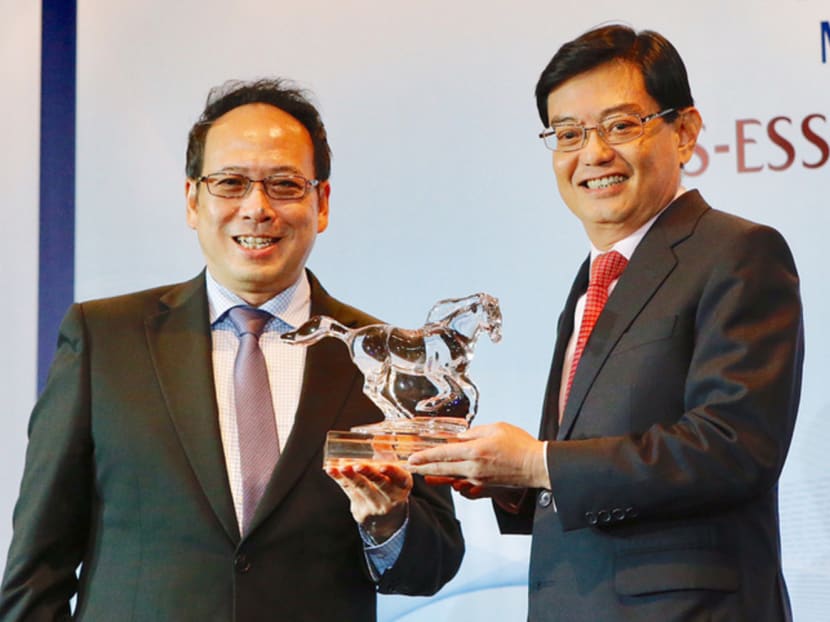Recipe to ride waves of change: Firms, workers ‘must build capabilities’
SINGAPORE — With uncertainty about how technology will affect the global economy, firms and employees must build their capabilities to prepare for the future, Finance Minister Heng Swee Keat said last night.

Professor Euston Quah (left) presenting Finance Minister Heng Swee Keat with an honorary fellowship of the Economic Society of Singapore. In a speech, Mr Heng stressed that human and corporate capabilities go hand in hand. Photo: Najeer Yusof
SINGAPORE — With uncertainty about how technology will affect the global economy, firms and employees must build their capabilities to prepare for the future, Finance Minister Heng Swee Keat said last night.
Speaking at the 61st annual dinner for the Economic Society of Singapore, Mr Heng outlined short-term challenges and long-term trends faced by Singapore and the rest of the world.
These include an ageing population, the global slowdown of productivity growth and different views about the impact of technology on jobs.
“We won’t feel the full effects of these trends tomorrow and no one can predict the future. But we can prepare,” he said.
“Strong corporate and human capabilities give us the best chance of riding the waves of changes ahead.”
Firms will have to embrace innovation, internationalise, and deepen their human capital, he added. “There is no formula for this. Every company must develop its own (capabilities).”
He noted that some start-ups have set up partnerships with established companies to market their innovations, while large companies are also establishing corporate venture funds and investing in promising start-ups.
ST Engineering, for instance, started an innovation lab called Innosparks at one-north in 2014.
Start-up incubator Block71, a partnership between NUS Enterprise and the Salim Group, was launched last week in Indonesia.
“We should encourage a variety of approaches to innovation, including the use of technology, and create some flexibility in our regulatory frameworks, like regulatory sandboxes, to allow new things to be tried,” said Mr Heng, who was named the society’s sixth Honorary Fellow yesterday.
Firms within and across industries must also collaborate to build capabilities, Mr Heng said, recalling his visit to a Swiss company which helped 100 students operate complex machinery — even though it needed only 60 recruits.
On why it was training students who could end up working for rival firms, the firm’s chief executive explained that a shortage of talent would affect the whole industry. “For me, it was a lesson in competing and cooperating at the same time,” said Mr Heng.
Stressing that human and corporate capabilities go hand in hand, Mr Heng said that apart from domain-specific skills, employees should equip themselves with general ones that will increase in economic significance, like the ability to work with digital tools.
To keep up with changing skills requirements, when and how learning happens must also be flexible, he explained, citing how learning can take place on the job, interspersed with bouts of intense, modular training.
“Individuals will have to shift from ‘learning, then doing’ to ‘lifelong learning and doing’,” he said.
The Republic is well-placed to manage the major structural changes confronting it, and businesses and its people must continue to build strong capabilities to make the most of these advantages, Mr Heng said.
“There is no playbook to follow. What we need is the right mindset — to be proactive, dare to take risks, and learn from our failures, and recognise that this is a continuous journey of upgrading,” he told an audience of about 800 people. They included government officials, chief executive officers in the private sector, society members, academics and international experts.
Emeritus Senior Minister Goh Chok Tong and Second Minister for Manpower Josephine Teo were also present.
Asked at a later dialogue if he was happy with Singapore’s economic growth, Mr Heng said: “I could he happier. But this is something we need to consider carefully.”
Singapore’s slow labour force growth — due to an ageing population — has a bearing on its economic growth, he said, noting how he had had to deal with falling student populations during his time at the Education Ministry. The reason for falling productivity growth across many countries is a “global puzzle”, he said.
“I don’t think that we can be immune to whatever is confronting other economies, so we should do our best to understand this productivity growth, we should do our best to see what we can do about it.”
Different players in society must develop a shared understanding of these challenges, he added, and work together to craft and implement solutions. “It is a way we can try to do this. Will it succeed? Well, we can never be sure until we try. But if we don’t try, we will never succeed.”






